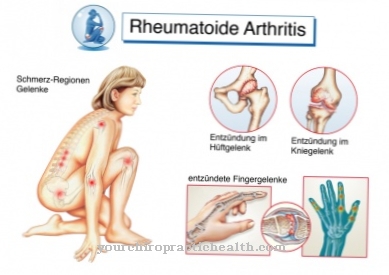A Cognitive disorder occurs when the processing of sensory impressions in the brain does not proceed properly. The reasons for perceptual disorders can be varied. A therapy is determined individually depending on the degree and type of perceptual weakness and carried out by specialists.
What are perceptual disorders?

The Cognitive disorder affects the central nervous system, where the processing of sensory impressions (the visual, auditory, olfactory, gustatory and tactile perceptions) does not take place normally for a specific reason.
In the narrower sense, one speaks of perception disorders when the feeling, the connection of the sensory systems or the sequence of sensory stimuli are affected. There are three types of perception disorders: the tactile-kinesthetic, the intermodal and the serial perception disorders.
causes
The reasons of the Cognitive disorders can be different. It can be congenital defects, but also acquired defects that cause the perception disorder.
In some patients it is a visual or hearing impairment that was not treated in time. If this weakness has existed for a long time and was corrected late or not at all with glasses or hearing aids, then those affected have insufficient experience in perceiving everyday events.
This lack of experience contributes to the cognitive disorder. Another cause of a perceptual disorder can be a developmental and maturation disorder that arises due to a lack of support and stimulation. Extensive medical and psychological examinations are necessary to determine the exact reasons for the cognitive disorder.
You can find your medication here
➔ Medicines for visual disturbances and eye complaintsDiseases with this symptom
- Developmental Disorders in Children
- Agnosia
- Age-related hearing loss
Diagnosis & course
The first step in diagnosis is through observation. If the above-mentioned weaknesses can be observed, those affected (or relatives of those affected) should contact a doctor. It can happen, especially in children, that it is only a matter of a temporary weakness in perception.
Psychologists, specialists, therapeutic and special educators can make a precise diagnosis. First, the affected sensory organs are examined; neurological examinations may also be necessary to determine the reasons for the Cognitive disorder to be able to determine.
Normally, we consciously and unconsciously perceive the environment continuously through our five sensory impressions, i.e. hearing, touching, smelling, tasting and seeing. The external stimuli are passed on to the brain and processed there.
After this processing, we hear a sound or an actual image appears in front of us. At a Cognitive disorder this processing does not happen or not completely. In the processing and shaping of our perceptions, previous experiences and our wishes play a major role. An example of the disruption of visual perception is that those affected cannot grasp the spatial position of an object or have difficulty recognizing the same shapes.
An example of an auditory perception disorder is when patients find it difficult to break down words into sounds. It happens that those affected do not notice if it is too hot or too cold for them. This is a physical perception disorder.
Complications
>
In many cases, a person has a perception disorder from birth. This usually cannot be treated and does not go away on its own. If a perceptual disorder occurs over time, it can be treated in many cases. Glasses and hearing aids help people see and hear.
Most often these devices also help to stop the development of the cognitive disorder. If, in the case of a perceptual disorder, no treatment is received or no appropriate help is used, the disorder usually worsens. The eyes can be weakened even further as the muscles have to strain to see clearly.
If the ear canal is disturbed, the volume is often increased, which leads to further damage to the ears. Therefore, cognitive disorders should always be treated with a doctor. Without treatment, they can lead to severe headaches or psychological problems. The affected person is often disoriented and feels fear due to the physical changes. A perception disorder can also occur when the sensory organs function properly, but the signals are not or incorrectly evaluated. In these cases, no direct treatment is possible.
When should you go to the doctor?
Perceptual disorders are to be taken seriously, as they can have dangerous causes. It is therefore essential to see a doctor. Only a doctor can make a reliable diagnosis and initiate appropriate treatment steps. Those affected should therefore in no way hesitate. The family doctor can be the first point of contact. The symptoms can be discussed extensively with him.
In the case of children, a pediatrician should be consulted immediately. Since a child's physical development is not yet fully completed, parents must take immediate action. You should involve a pediatrician immediately. Depending on the type and extent of the perception disorders, other medical contacts may also be considered. If the perceptual disorders lead to language difficulties, a speech therapist should be consulted. In addition, curative teachers, occupational therapists and physiotherapists can help with the treatment.
However, these should only be visited after a prior consultation with a family doctor. Based on his medical experience, he can refer you to the most competent specialist. It may also be necessary to consult a neurologist or ear, nose and throat specialist.
Doctors & therapists in your area
Treatment & Therapy
If the causes of the Cognitive disorder are physical, the causes are treated first to eliminate the weakness. Otherwise, special training courses will help, in which the deficient skills are treated. The therapies are carried out by psychologists, physiotherapists, occupational therapists, curative educators and speech therapists.
The Affolter method or guided interaction therapy, named after the Swiss psychologist and psychotherapist Félicie Affolter, is an everyday treatment method based on the sense of touch that can be used in the event of a perception disorder. This means that the relationship between the body and the environment is recognized through the targeted guidance of body parts, especially the hands.
The therapist guides the patient's hands in a targeted manner during everyday situations so that the patient can recognize the environment through touch. In this way, the patients can get the information they feel. This therapy achieves the improvement of perception and the expansion of the perceived search for information.
In this way, those affected get more information about the environment and acquire a greater understanding of it.They become more flexible, more independent, and even their language skills improve. The therapy promotes motor, cognitive and emotional performance. Of course, the earlier the deficits are recognized and treated, the faster the healing process.
Outlook & forecast
The cognitive disorder can have different courses, which usually depend heavily on the cause of the cognitive disorder. If the perception disorder occurs due to the consumption of alcohol or other drugs, it usually disappears after a short time when the respective substance is discontinued and no longer taken. In cases of addiction, withdrawal is necessary for this.
Excessive drug use can also damage certain nerves in the body and cause cognitive disorders in those areas. Some medications can also trigger cognitive disorders and should then be replaced by another or completely discontinued after consulting a doctor.
If the perception disorder occurs in the ears or eyes, these disorders can be treated relatively well. For this purpose, glasses, contact lenses or hearing aids are available to those affected so that the perception disorder can be well balanced. In most cases, if the cognitive disorder can be treated, it will not lead to further complications.
In certain syndromes, an intellectual disability leads to a cognitive disorder. A general prediction about the course of the disease in the case of a perceptual disorder is hardly possible, since the treatment and its success depend heavily on the cause of the disease.
You can find your medication here
➔ Medicines for visual disturbances and eye complaintsprevention
In many cases there is one Cognitive disorder since birth. It is therefore an important preventive measure that the pregnant woman does not smoke, drink alcohol or take any other drugs. On the medical side, an under-supply of oxygen should be avoided during the birth process and consideration should be given to not having a caesarean section.
In addition, a child who grows up in a loving and stimulating world will be less likely to suffer from a cognitive disorder later on.
You can do that yourself
Disturbances in perception can have serious causes and should be examined by a doctor in any case. However, some of the symptoms can be relieved with the help of home remedies and practical measures. First of all, it is advisable to record the symptoms in a diary and to precisely note the type and intensity of the disturbances.
Mild perception disorders can often be reduced by physical exercise, relaxation or a balanced meal. Sometimes the symptoms are also due to exhaustion or dehydration. If you suspect perception disorders, you should therefore first question your own lifestyle. If there are no abnormalities, the disorders may be due to an allergy or intolerance that can be treated by avoiding the substance in question. If heat stroke is the cause, bed rest and cooling applications such as a cold compress help.
Chronic perceptual disorders that lead to impairments in everyday life should be discussed with your family doctor. If the offspring is affected, the pediatrician should be spoken to first. Depending on the type of complaint, other contacts are also speech therapists, curative educators, occupational therapists or physiotherapists. In the case of auditory perception disorders such as tinnitus, we recommend going to the ear doctor.
























.jpg)



